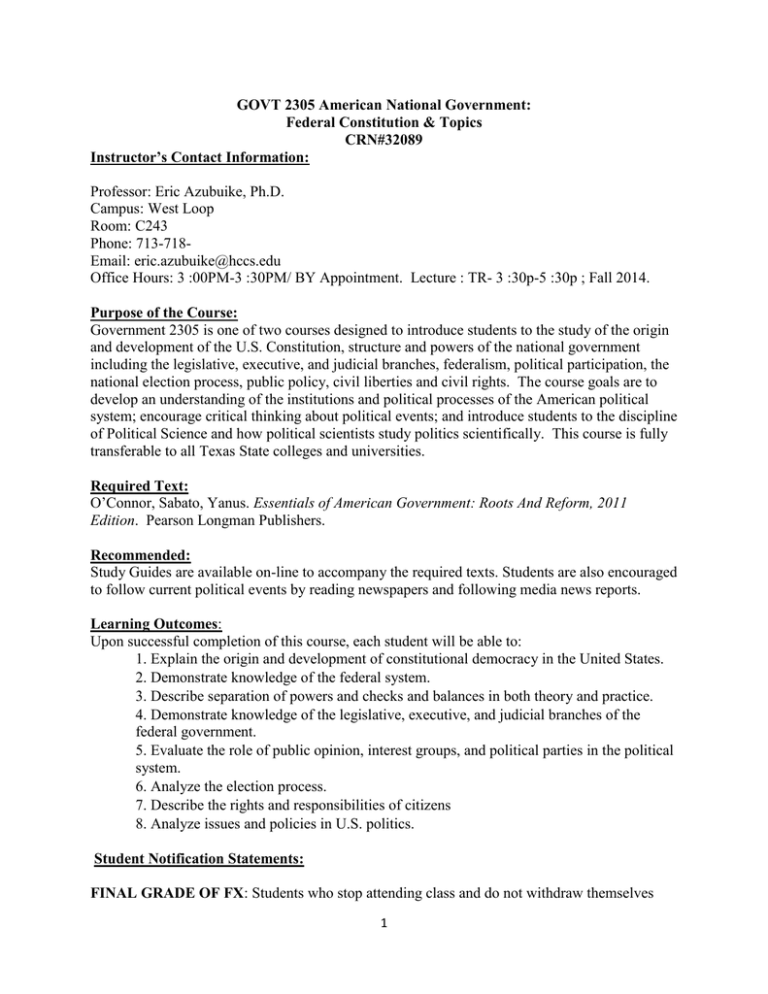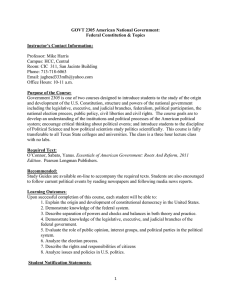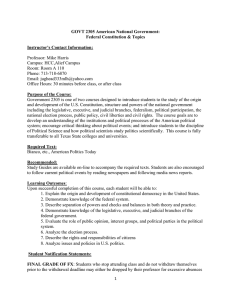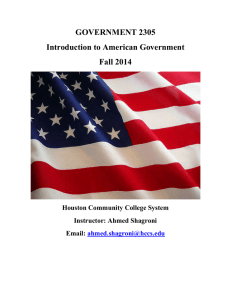
GOVT 2305 American National Government:
Federal Constitution & Topics
CRN#32089
Instructor’s Contact Information:
Professor: Eric Azubuike, Ph.D.
Campus: West Loop
Room: C243
Phone: 713-718Email: eric.azubuike@hccs.edu
Office Hours: 3 :00PM-3 :30PM/ BY Appointment. Lecture : TR- 3 :30p-5 :30p ; Fall 2014.
Purpose of the Course:
Government 2305 is one of two courses designed to introduce students to the study of the origin
and development of the U.S. Constitution, structure and powers of the national government
including the legislative, executive, and judicial branches, federalism, political participation, the
national election process, public policy, civil liberties and civil rights. The course goals are to
develop an understanding of the institutions and political processes of the American political
system; encourage critical thinking about political events; and introduce students to the discipline
of Political Science and how political scientists study politics scientifically. This course is fully
transferable to all Texas State colleges and universities.
Required Text:
O’Connor, Sabato, Yanus. Essentials of American Government: Roots And Reform, 2011
Edition. Pearson Longman Publishers.
Recommended:
Study Guides are available on-line to accompany the required texts. Students are also encouraged
to follow current political events by reading newspapers and following media news reports.
Learning Outcomes:
Upon successful completion of this course, each student will be able to:
1. Explain the origin and development of constitutional democracy in the United States.
2. Demonstrate knowledge of the federal system.
3. Describe separation of powers and checks and balances in both theory and practice.
4. Demonstrate knowledge of the legislative, executive, and judicial branches of the
federal government.
5. Evaluate the role of public opinion, interest groups, and political parties in the political
system.
6. Analyze the election process.
7. Describe the rights and responsibilities of citizens
8. Analyze issues and policies in U.S. politics.
Student Notification Statements:
FINAL GRADE OF FX: Students who stop attending class and do not withdraw themselves
1
prior to the withdrawal deadline may either be dropped by their professor for excessive absences
or be assigned the final grade of "FX" at the end of the semester. Students who stop attending
classes will receive a grade of "FX", compared to an earned grade of "F" which is due to poor
performance. Logging into a DE course without active participation is seen as non-attending.
Please note that HCC will not disperse financial aid funding for students who have never
attended class. Students who receive financial aid but fail to attend class will be reported to the
Department of Education and may have to pay back their aid. A grade of "FX" is treated exactly
the same as a grade of "F" in terms of GPA, probation, suspension, and satisfactory academic
progress.
ADA Statement: Any student with a documented disability (e.g. physical, learning, psychiatric,
vision, hearing, etc.) who needs to arrange reasonable accommodations must contact the Ability
Services Office at the respective college at the beginning of each semester. Faculty is authorized
to provide only the accommodations requested by the Ability Services Office. At Southwest
College, students should contact Dr. Becky Hauri at 713-718-7909. Students who are requesting
special testing accommodations must first contact the appropriate (most convenient) DSS office
for assistance:
Disability Support Services Offices:
System: 713.718.5165
Central: 713.718.6164 – also for Deaf and Hard of Hearing Services and Students Outside of the
HCC District service areas.
Northwest: 713.718.5422
Northeast: 713.718.8420
Southeast: 713.718.7218
Southwest: 713.718.7909
EGLS3: At Houston Community College, professors believe that thoughtful student feedback is
necessary to improve teaching and learning. During a designated time near the end of the term,
you will be asked to answer a short online survey of research-based questions related to
instruction. The anonymous results of the survey will be made available to your professors and
department chairs for continual improvement of instruction. Look for the survey as part of the
Houston Community College Student System online near the end of the term.
HCC Course Withdrawal Policy: The State of Texas imposes penalties on students who drop
courses excessively. Students are limited to no more than SIX total course withdrawals
throughout their educational career at a Texas public college or university.
Student Services: DISTANCE EDUCATION ADVISING AND COUNSELING SERVICES:
Much DE student information can be found on the DE Student Services website: de.hccs.edu.
Advising or counseling can be accomplished through our online request form AskDECounseling.
Counselors and Student Services Associates (SSA) can assist students with admissions,
registration, entrance testing requirements, degree planning, transfer issues, and career
counseling. In-person, confidential sessions, can also be scheduled to provide brief counseling
and community referrals to address personal concerns impacting academic success.
2
International Students: International Students are restricted to ONLY ONE online/distance
education class per semester. Please contact the International Student Office at 713-718-8520 if
you have additional questions about your visa status.
Core Objectives:
The Higher Education Coordinating Board (THECB) mandates that the core curriculum must ensure
that students will develop the essential knowledge and skills they need to be successful in college, in a
career, in their communities, and in life. Through the Texas Core Curriculum, students will gain a
foundation of knowledge of human cultures and the physical and natural world, develop principles of
personal and social responsibility for living in a diverse world, and advance intellectual and practical
skills that are essential for all learning.
Students enrolled in GOVT 2305/2306 core curriculum courses will complete assessments designed to
measure the following core objectives:
o Critical Thinking Skills—to include creative thinking, innovation, inquiry, and analysis,
evaluation and synthesis of information
o Communication Skills—to include effective development, interpretation and expression of ideas
through written, oral and visual communication
o Personal Responsibility—to include the ability to connect choices, actions and consequences to
ethical decision-making
o Social Responsibility—to include the ability to connect choices, actions, and consequences to
ethical decision-making
Student assessment of proficiencies mandated by THECB may include testing, projects, or assignments.
(Sample) Course Grading:
Your grade will be based on your performance on three multiple choice exams and one research
paper. Each of these will be worth 100 points. The resulting grading scheme will be as follows:
360 to 400 points……………..A
320 to 359 points……………..B
280 to 319 points……………..C
240 to 279 points……………..D
<240 points………………….F
(Sample) Research Paper.
You must write a 3-5 page research paper (double-spaced, typed, 12 point font.). The paper must
contain at least five quality citations. Follow the APA Style Manual. Details for this paper
assignment including due date will be emailed to you during the first two weeks of the semester.
(Sample) Make-up Policy.
There are no makeups in this course.
Broad Course Calendar and Assignments
Section One: Foundations of Government
3
Topic 1 The Political Landscape and the Constitution
Declaration of Independence
Topic 2 Federalism, Civil Rights and Civil Liberties
Federalist Paper #10
Chapters 1 & 2, Appendix I The
Chapters 3, 4, 5, Appendix II
Exam One
Section Two: Institutions of Government
Topic 3 Congress
Chapter 6, Appendix II Federalist
Paper #51
Topic 4 The Presidency and the Federal Bureaucracy
Chapters 7, 8
Topic 5 The Judiciary
Chapter 9, Appendix II Federalist
Paper #78
Exam Two
Section Three: Political Behavior
Topic 6 Public Opinion and The News Media
Topic 7 Political Parties and Interest Groups
Topic 8 Elections, Campaigns,and Voting
Chapter 10
Chapter 11
Chapter 12
Exam Three
Section Four: Public Policy
Topic 9 Social and Economic Policy
Topic 10 Foreign and Defense Policy
Final Exam
Chapter 13
Chapter 14
4
LECTURE TENTATIVE COURSE OUTLINE FOR ADOPTION
09/23-25
Discussion of Syllabus.
Introduction: Concepts--- Politics, Government, Political Science,
Types of Government: Democracy, Republic, Confederation of States,
Monarchy, Totalitarianism, Oligarchy.
9/30
10/2
Chapter 1 (American Government: Roots, Context, and Culture)
2 (The Constitution).
Read the chapter.
10/7
3. The Federal System
Read: chapter 3.
10/9
* QUIZ # 1. (concepts, Chapters 1-3)
10/9-14
4. Civil Liberties
10/16-21
5. Civil Rights
10/21
10/23
***Homework Assignment Submission (Worth 30 Points)
6. The U.S. Congress
Read: chapter 6
10/28
7. The Presidency
(Group Presentation)
Read: chapter 7.
10/30
11/04-6
Exam # 1 Chapters (4, 5, 6 and 7).
8.The Executive Branch &Fed. Bureaucracy (Group Presentation)
Read: chapter 8
11/11
11/13-
In-class Activity
10. Public Opinion & The News Media (Group Presentation)
Read: chapter 10.
11/18
11. Political Parties & Interest Groups.
5
(Group Presentation)
Read: chapter 11.
11/20
12. Campaigns & Elections.
(Group Presentation)
Read chapter 12
11/25-12/02
14. U.S. Foreign and Defense Policy
Read: chapter 14.
12/04
FINAL EXAM REVIEW
12/09/2014
FINAL EXAM
(Chapters 8,10, 11, 12, 14).
(Chapters 8, 10, 11, 12, 14).
NOTE!! The Professor reserves the discretion to alter/modify any part of this
Syllabus and notify the class accordingly.
6

![2305 Fall Syllabi-GOVT[1] 2305.doc](http://s2.studylib.net/store/data/015273488_1-2e047a3bad7718eba503d55d75c8658a-300x300.png)



